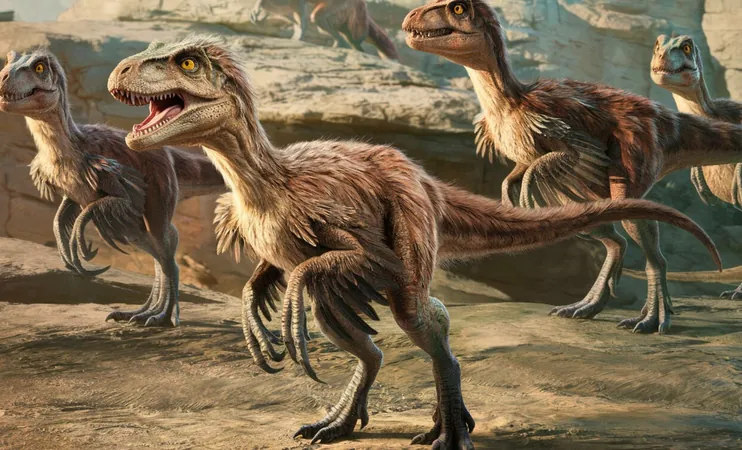
Unraveling the Enigma of Dinosaur Intelligence: Who Were the Smartest Dinosaurs?
2025-01-01
Author: Ming
The question of dinosaur intelligence has intrigued scientists and enthusiasts alike for generations, challenging the outdated notion that these prehistoric creatures were merely instinctive and brutish. New research has emerged, shedding light on the cognitive skills of various dinosaur species, suggesting that some were far smarter than we ever gave them credit for.
Tyrannosaurus Rex: The Apex Predator with a Brain to Match?
The legendary Tyrannosaurus rex, often painted as the ultimate predator, has also sparked much debate regarding its intelligence. Traditionally, its success was attributed to its ferocity and physical prowess. However, a groundbreaking study led by Dr. Emily Wright from the University of Alberta in 2024 brought fresh insights to the table. By employing cutting-edge imaging techniques on fossilized skulls, researchers discovered that the T. rex's neuron count was comparable to that of modern crocodiles, known primarily for their instinctual behavior rather than advanced cognitive abilities.
Despite its limited problem-solving skills, the T. rex excelled in sensory perception, particularly in sight and smell. Fossils suggest it was a dominant predator during the late Cretaceous period, thriving in ecosystems approximately 68-66 million years ago. The intelligence attributed to T. rex might not be as extraordinary as previously thought, but its sensory superiority undoubtedly made it a lethal hunter.
Troodon: The Most Intelligent Dinosaur?
Regarded by many paleontologists as the "brainiest" dinosaur, Troodon, a small, feathered theropod, boasted an impressive brain-to-body ratio. Roughly 1.2 meters tall and weighing around 50 kilograms, its physical stature belied its mental capabilities. With large optic lobes indicating remarkable vision, Troodon likely thrived on nocturnal hunts.
Dr. Sarah McConnell from the Royal Tyrrell Museum highlights that Troodon's brain structure suggests advanced sensory processing and potentially complex decision-making abilities. Evidence from fossil sites reveals its predatory prowess over small mammals and reptiles, utilizing its keen eyesight and sharp claws. The dinosaur’s enlarged cerebral hemispheres further imply a capacity for learning and memory, hinting at a more intricate behavioral repertoire than its larger counterparts.
Velociraptor: More than Just a Movie Star?
Famed for its portrayal in films, the Velociraptor was smaller yet possessed impressive agility and intelligence. Fossils found in Mongolia's Djadokhta Formation, dating back 75 million years, indicate that these feathered creatures exhibited behaviors possibly linked to pack hunting. Although direct evidence is scarce, the “Fighting Dinosaurs” fossil has provided valuable insights into their behavior patterns, hinting at sophisticated hunting strategies.
Dr. Alan Smith from the American Museum of Natural History uncovered wear patterns on Velociraptor’s claws and teeth, suggesting clever feeding strategies and precision in attacks. This indicates not only advanced motor skills but also the potential for learned behaviors—traits associated with higher intelligence than previously acknowledged.
A Comparative Look at Dinosaur Cognition
To put their intelligence into perspective, consider a brief overview comparing the cognitive abilities of these remarkable species.
- **Tyrannosaurus rex**: Exceptional sensory capabilities but limited problem-solving skills.
- **Troodon**: High brain-to-body ratio with advanced sensory processing and potential memory retention.
- **Velociraptor**: Evidence of coordinated hunting and sophisticated feeding strategies.
Rethinking Dinosaur Intelligence: A New Paradigm
While it can be tempting to judge ancient reptiles by modern standards of intelligence, they exhibited unique cognitive adaptations tailored to their environmental challenges. From the instinct-driven prowess of T. rex, through Troodon’s cerebral complexity, to Velociraptor’s social strategies, these dinosaurs showcase that intelligence is tailored and diverse.
As paleontological methods continue to evolve, our understanding of these captivating creatures may unfold new secrets of their behavioral complexities. Indeed, the legacy of dinosaur intelligence remains an exhilarating frontier for scientific exploration!


 Brasil (PT)
Brasil (PT)
 Canada (EN)
Canada (EN)
 Chile (ES)
Chile (ES)
 Česko (CS)
Česko (CS)
 대한민국 (KO)
대한민국 (KO)
 España (ES)
España (ES)
 France (FR)
France (FR)
 Hong Kong (EN)
Hong Kong (EN)
 Italia (IT)
Italia (IT)
 日本 (JA)
日本 (JA)
 Magyarország (HU)
Magyarország (HU)
 Norge (NO)
Norge (NO)
 Polska (PL)
Polska (PL)
 Schweiz (DE)
Schweiz (DE)
 Singapore (EN)
Singapore (EN)
 Sverige (SV)
Sverige (SV)
 Suomi (FI)
Suomi (FI)
 Türkiye (TR)
Türkiye (TR)
 الإمارات العربية المتحدة (AR)
الإمارات العربية المتحدة (AR)